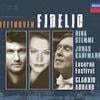
It’s painful to listen to Beethoven’s Fidelio — an opera about injustice, the strength of women, and freedom from oppression — in the shadow of the Afghanistan debacle, in which many people will lose their freedom and/or lives. Beethoven’s heart-touching melodies seem far too polite. Yet when this new recording from Marek Janowski and the Dresden Philharmonic really gets going, primarily during “Abscheulicher! Wo eilst du hin?” (You monster! Where are you rushing to?), the great first act aria of Leonore (Lise Davidsen), and in the vital Act Two Quartet, “Es sterbe!” (He shall die), in which Leonore comes out from under her male disguise and declares that she shall save her imprisoned husband, Florestan (Christian Elsner), the unity of thrilling singing, spot-on conducting and playing, and gorgeous music is so powerful that nothing else matters.
This new high-resolution Pentatone issue was planned as a live performance, but the pandemic intervened. Miraculously, two months after the canceled performance date, all the principals found themselves again in Dresden, where voices and socially distanced orchestra were set down in the Kulturpalast. Five months later, after the stage could be enlarged to enable the choristers to sing at a safe distance from each other, choruses were set down and then patched in.
Davidsen, who has been winning award after award, vindicates her reputation as the most vocally equipped and expressively voiced dramatic soprano of our time. 33 at the time of the recording, she sings with such commitment, urgency, and strength as to justify comparison with the other great Leonores on record. While I prefer the extra duration she gives to the climactic high note of “Abscheulicher!” on her recent Decca recital, the fact that she here rises up to that note with commanding strength and then completes the rest of the phrase in a single breath serves as testament to rock solid technique. Never does she seem stressed, and never does her voice sound less than beautiful. Listen, for example, to her softer radiant and tender singing in the middle of the ecstatic duet, “O namenlose Freude!” (Oh, what boundless happiness!), when Florestan and Leonore sing (in translation), “It is you!”... “It is me!”
Elsewhere, however, many of the other principals disappoint. Elsner only sounds fresh and lovely lower in his range; when he rises higher and puts the voice under pressure, as must any self-respecting tenor who sings this heroic role, he sounds stressed and vitiated. I suppose one could say that he’s singing in the voice of a starving and dehydrated prisoner, but that will simply not do for Beethoven’s music. Florestan’s great opening aria, Act Two’s “Gott! Welch Dunkel hier! ... In des Lebens Frühlingstagen” (God! What darkness here! ... In the spring days of my life), sounds from the throat of a man who is far beyond the spring of his career. Elsner pales beside Davidsen in their duets, sounding far weaker than he should.
Nor is Elsner the only example of miscasting. You won’t necessarily be able to figure out who’s who from the booklet, which neglects to connect singers with roles, but baritone Johannes Martin Kränzle sounds nowhere mean enough for the evil Don Pizarro. Tenor Cornel Frey (Jacquino) and soprano Christina Landhamer (Marzelline) provide winning contrast as the hapless couple, but the beautiful voice of bass Georg Zeppenfeld (Rocco) does not compensate for insufficient characterization. Bass-baritone Günther Groissböck (Don Fernando) makes for a strong, authoritative, and compassionate Prime Minister, but his arrival comes too late in the opera to reverse opinions about the casting as a whole.
Solo orchestral passages and choral contributions help pull the opera along. The triumphant finale, “Wer ein holdes Weib errungen” (Whoever calls a faithful wife his own), in which chorus and six of the principals get going, is marvelous.
Which cannot be said for the spoken dialogue. There’s lots of it, and it is essential to the action. Unfortunately, the contradiction between the drama these singers invest in their singing and their careful and too-often deadpan enunciation kills the opera’s forward momentum. Most of the cast, including Davidsen, sound like they’re reading through the script for the first time. A great Fidelio recording moves in a great and powerful arc from beginning to end; Janowski’s stops and starts so frequently that if one were driving a car through traffic like this, one might be tempted to find an alternate route.




